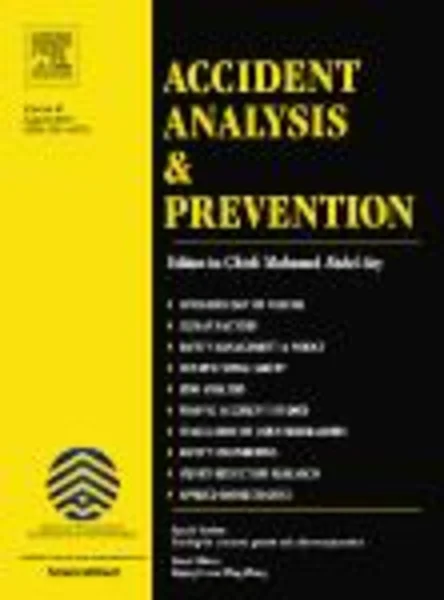-
age differences in simulated driving performance: compensatory processes
جزئیات بیشتر مقاله- تاریخ ارائه: 1392/01/01
- تاریخ انتشار در تی پی بین: 1392/01/01
- تعداد بازدید: 822
- تعداد پرسش و پاسخ ها: 0
- شماره تماس دبیرخانه رویداد: -
in the context of driving, the reported experiment examines compensatory processes for age-related declines in cognitive ability. younger (26–40 years) and older (60+ years) participants (n = 22 each group) performed a car following task in a driving simulator. several performance measures were recorded, including assessments of anticipation of unfolding traffic events. participants also completed a range of measures of cognitive ability – including both fluid and crystallised abilities. three examples of age-related compensation are reported: (i) older drivers adopted longer headways than younger drivers. data were consistent with this being compensation for an age-related deficit in complex reaction time; (ii) older drivers with relatively higher cognitive ability anticipated traffic events more frequently, whereas the reverse pattern was found for younger drivers; and, (iii) older drivers with greater crystallised ability were less reliant on spatial ability to maintain lane position. consistent with theories of ‘cognitive reserve’, interactions between crystallised ability and age for self-report workload suggested that compensation for age-related cognitive ability deficits required investment of additional effort. results are considered in the context of the prospects of further assessment of older drivers.
مقالات جدیدترین رویدادها
-
استفاده از تحلیل اهمیت-عملکرد در ارائه الگوی مدیریت خلاقیت سازمانی و ارائه راهکار جهت بهبود
-
بررسی تاثیر ارزش وجوه نقد مازاد بر ساختار سرمایه شرکت های پذیرفته شده در بورس اوراق بهادار تهران
-
بررسی تأثیر سطح افشای ریسک بر قرارداد بدهی شرکت های پذیرفته شده در بورس اوراق بهادار تهران
-
بررسی تأثیر رتبه بندی اعتباری مبتنی بر مدل امتیاز بازار نوظهور بر نقد شوندگی سهام با تأکید بر خصوصی سازی شرکت ها
-
تأثیر آمیخته بازاریابی پوشاک ایرانی بر تصویر ذهنی مشتری پوشاک ایرانی (هاکوپیان)
-
مقایسه تأثیر آموزش بر مبنای نقشه مفهومی با روش تلفیقی بر یادگیری درس فرآیند پرستاری دانشجویان پرستاری دانشگاه علوم پزشکی تبریز
-
چگونه می توانم اختلال در خواندن مهسا را بهبود ببخشم؟
-
دندان دوتایی ثنایای پیشین فک بالا: معرفی یک مورد
-
شناسایی و ارزیابی ریسک آلاینده های هیدروکربنی موجود در آب خام مصرف شده و پساب خروجی از پالایشگاه
-
kinetics and equilibriums for adsorption of poly(vinyl alcohol) from aqueous solution onto natural bentonite
مقالات جدیدترین ژورنال ها
-
مدیریت و بررسی افسردگی دانش آموزان دختر مقطع متوسطه دوم در دروان کرونا در شهرستان دزفول
-
مدیریت و بررسی خرد سیاسی در اندیشه ی فردوسی در ادب ایران
-
واکاوی و مدیریت توصیفی قلمدان(جاکلیدی)ضریح در موزه آستان قدس رضوی
-
بررسی تاثیر خلاقیت، دانش و انگیزه کارکنان بر پیشنهادات نوآورانه کارکنان ( مورد مطالعه: هتل های 3 و 4 ستاره استان کرمان)
-
بررسی تاثیر کیفیت سیستم های اطلاعاتی بر تصمیم گیری موفق در شرکتهای تولیدی استان اصفهان (مورد مطالعه: مدیران شرکتهای تولیدی استان اصفهان)
-
ماهیت رجوع از شهادت و پیامدهای آن
-
بررسی جرم قاچاق انسان در اسناد بین المللی و حقوق داخلی ایران
-
منقول یا غیر منقول بودن دعوای الزام به تنظیم سند رسمی در حقوق ایران
-
تاثیر اخلاق کار اسلامی بر عدالت سازمانی
-
فراترکیب پژوهش شبکه های اجتماعی مجازی در ایران




سوال خود را در مورد این مقاله مطرح نمایید :